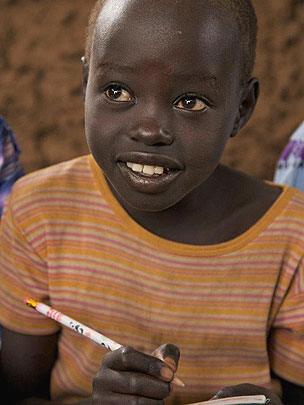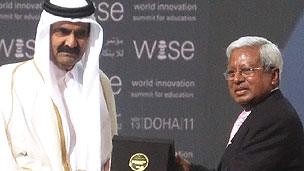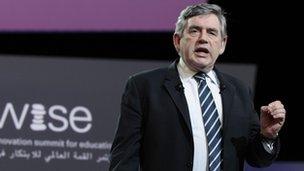Fairness challenge from first global education 'laureate'
- Published
How Qatar is trying to put itself on the educational map
There isn't a Nobel Prize for education. But this month has seen the launch of an award that would like to have such a similar international status.
The inaugural World Innovation Summit for Education (WISE) Prize was announced in Doha, Qatar, with the $500,000 (£310,000) award being given to Sir Fazle Hasan Abed, whose work has brought education to millions of children in impoverished families.
Sir Fazle, the first education "laureate", has worked across decades and continents to help communities to escape the quicksand of poverty and to gain skills and self-reliance.
Created in Bangladesh in 1972, his BRAC project - formerly the Bangladesh Rural Advancement Committee - is now claimed as the biggest non-governmental organisation in the world.
An estimated 10 million primary pupils have been taught in schools set up by Brac across 10 countries, in such tough territories as South Sudan and Afghanistan.
It's a vast operation, running more schools in Bangladesh than the entire English school system, and it is claimed to be the "largest private, secular education system in the world".
Equal chances
Working with the poorest, most disadvantaged rural communities, often blighted with conflict, exploitation and disease, this is the raw edge of education, with one-room classrooms and basic skills.

First day at school in a BRAC project in Manderia village in Torid, South Sudan
But speaking after the award, Sir Fazle says that the greatest challenge for global education applies as much to the more affluent countries as to the poorest. And that big problem, he says, is inequity, the stubborn link between family income and educational outcome.
"A child born in a poor household has less chance of going to university than a child born in a wealthy household, in almost every society.
"So how do we remove this inequity? Every child should have the same opportunity."
BRAC works to alleviate poverty on a broad range of fronts - from micro-credit to health schemes - but he says that education is becoming ever more important.
"It's so important for our survival, our progress, that every country wants to put more resources into education."
This isn't simply about economic progress, as he links education and literacy to the building of self-worth and self-help for individuals and communities. It provides the key to understanding "the power structure and how to change it".
Life changing
His own commitment to development stemmed from the life-changing experience of the cyclone that hit Bangladesh in 1970. It turned an accountant into an activist.

Sir Fazle Hasan Abed was awarded the inaugural WISE Prize for international education
"Many people died, and I saw the loss of many people, the corpses lying in the fields. That changed my philosophy, I found that life was so fragile, you could die so easily. That changed my values about what kind of life I should lead," he says.
This was compounded by the "death and destruction" he saw during the war that accompanied Bangladesh's independence.
Such experiences profoundly affected him and pushed him to view his country "from the point of view of the poor". It made him "determined to achieve change", he says.
The award of the first WISE Prize was part of a wider event, the World Innovation Summit for Education.
This WISE summit wants to be a kind of Davos for education, bringing together the great and the good to hear about innovation in schools and universities.
It's supported by the Qatar Foundation, which has the succinct ambition to "convert the country's current, but temporary, mineral wealth into durable human capital". This translates as investing heavily in education and becoming a knowledge hub so that there's something of value left when the oil revenue eventually runs out.
It's a fast-forward project with parallels to creating the infrastructure for the World Cup. There is a 1,000 hectare Education City being developed, attracting university partners from the United States, France and the UK.
Missed goals
But big international promises, played out under the photographs and rhetoric of summits, can also turn out to be hollow.

Gordon Brown issued a call for a "global education fund" at the summit in Qatar
Gordon Brown, former UK prime minister and one of the speakers at the WISE event, delivered a blunt recognition that some of the Millennium Development Goals for 2015 were going to be missed.
"We know it is now impossible, I'm afraid, to achieve the Millennium Development Goal that would cut infant mortality by half - we are too far away."
There were other goals, signed by leading countries, that were going to be missed, he said.
But he called on governments, charities and philanthropists to mobilise to achieve the goal of universal primary education by 2015 - and proposed a "global fund for education".
Wikipedia's Jimmy Wales was among the WISE speakers and Mr Brown called on technology companies, such as Microsoft, Apple, Google and Facebook to play a part in bringing education to the "poorest part of the poorest country".
"We can reinforce in people's minds that when the world makes a promise, it is not a promise that is casually set aside and betrayed for millions of children of future generations, but a promise that we do everything in our power to keep," Mr Brown told the audience in Qatar.
He said that governments had to be held to their funding promises - and "where countries fall behind, we should be telling them that this is not acceptable".
There's a long way to go as one sobering statistic from BRAC makes clear. In 2011, when international conferences in the Gulf can be broadbanded round the world in seconds, it's still more likely that a girl in South Sudan will die in childbirth than finish primary school.